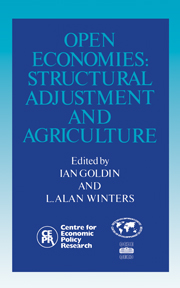Book contents
- Frontmatter
- Contents
- List of figures
- List of tables
- Preface
- Acknowledgements
- List of conference participants
- 1 Introduction: from macro to maize
- Part One Open economy analysis
- Part Two The small country assumption and trade reform
- Part Three Risk and adjustment
- Part Four Government's role
- 11 Infrastructure, relative prices and agricultural adjustment
- Discussion
- 12 Structural factors and tax revenue in developing countries: a decade of evidence
- Discussion
- 13 International dimensions of the political economy of distortionary price and trade policies
- Discussion
- Index
13 - International dimensions of the political economy of distortionary price and trade policies
from Part Four - Government's role
Published online by Cambridge University Press: 04 August 2010
- Frontmatter
- Contents
- List of figures
- List of tables
- Preface
- Acknowledgements
- List of conference participants
- 1 Introduction: from macro to maize
- Part One Open economy analysis
- Part Two The small country assumption and trade reform
- Part Three Risk and adjustment
- Part Four Government's role
- 11 Infrastructure, relative prices and agricultural adjustment
- Discussion
- 12 Structural factors and tax revenue in developing countries: a decade of evidence
- Discussion
- 13 International dimensions of the political economy of distortionary price and trade policies
- Discussion
- Index
Summary
One of the most important influences on structural adjustment is the trend in the terms of trade. This in turn is influenced by evolutionary changes in government distortions to incentives at home and abroad. Research on the differences in distortionary policies across countries and over time suggests that as economies grow, they tend gradually to change from taxing to subsidising farmers relative to other producers and from effectively subsidising to taxing food relative to other consumption. With global economic growth, the aggregate effect of this changing pattern of domestic distortions is thus to turn the international terms of trade increasingly against agriculture. For those countries with a potential comparative advantage in farm production – which includes many developing countries that are currently net food importers – this is clearly an undesirable policy trend.
Will we continue to see agricultural protectionism increase in advanced industrial economies and spread to newly industrialising economies as they grow, thereby worsening welfare in the vast majority of poorer economies by putting downward pressure on the relative price of farm products in international markets? Recent studies of the political economy of agricultural policies seem to suggest so (e.g., Anderson, Hayami et ai, 1986). However, those studies of vested interest group behaviour tend to focus on domestic political forces at work, and scarcely mention the prospect of additional international forces which may offset (or intensify) these domestic forces.
The neoclassical economists’ approach to seeking to understand why governments intervene in agricultural and other markets follows Stigler (1971) and Peltzman (1976), and begins with the assumption that a country's political leadership behaves so as to maximise its chances of remaining in office.
- Type
- Chapter
- Information
- Open EconomiesStructural Adjustment and Agriculture, pp. 290 - 309Publisher: Cambridge University PressPrint publication year: 1992
- 2
- Cited by



